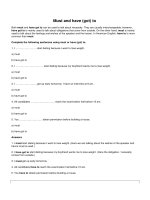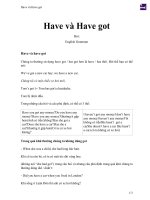Have and have got differences
Bạn đang xem bản rút gọn của tài liệu. Xem và tải ngay bản đầy đủ của tài liệu tại đây (8.38 KB, 1 trang )
Have and have got: differences
Have
and
have got
are usually possible with little or no difference of meaning. Both forms can be used to express
ideas such as possession and relationships. For example, the two sentences given below express the same idea.
I have a sister. = I have got a sister.
Got forms of have
are informal, and are most common in the present.
Do
is not used in questions and negatives
with
got.
I have got a car. (Informal)
I have a car. (More formal)
Have you got a car? / Do you have a car? (NOT Do you have got a car?)
Have got
cannot be used to talk about actions. Only
have
is possible in this case.
I usually
have
dinner at 8 o’clock. (NOT I usually have got dinner at 8 o’clock.)
Note that
have
and
have not
are only used in the present simple. In the past tense, only
had
is used.
Had not
is
not possible.
I
had
a strange experience yesterday. (NOT I had got a strange experience yesterday.)
Got forms of have
are not normally used to indicate repetition and habit.
I
have
a meeting on Monday. OR I
have got
a meeting on Monday.
I often
have
meetings on Mondays. (BUT NOT I often
have got
meetings on Mondays.)
Note that
have
is a state verb. It is not normally used in the continuous form.
She has a sister. (NOT She is having a sister.)
However,
having
is used in a few fixed expressions. Examples are: having dinner, having a bath etc.
Be first to know when grammar rules change! Sign up to our newsletter here: englishgrammar.org (It's free)
Powered by TCPDF (www.tcpdf.org)









